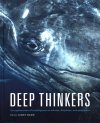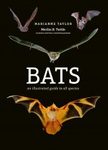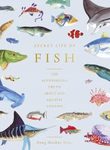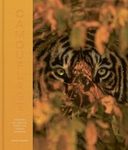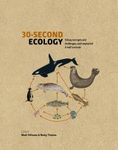By
Leon (NHBS Catalogue Editor)
19 Oct 2017
Written for Hardback

Cetacean intelligence remains a topic of intense interest, and has been the subject of several excellent books in recent years, such as
Are Dolphins Really Smart?,
The Cultural Lives of Whales and Dolphins, and
Dolphin Communication and Cognition. Ivy Press typically produces entry-level pop-science books, which is by no means intended as a disparaging qualification. I have read several of above-mentioned books, and even for a biologist coming from a different discipline, these are technical works. Ivy Press's
Deep Thinkers stands out by being both accessibly written and richly illustrated, making it a perfect entrance to this topic.
Rather than have one author cover this vast topic, the book is edited by Janet Mann who gathered a dream-team of researchers, each of whom has decades of research experience on dolphin and whale behaviour, and had them contribute a chapter each. Six chapters cover topics such as cetacean brains, perception and sensory organs, communication, sociality, culture, and tool use. The majority of these are very accessibly written distillations of the research projects of the authors, and of other relevant work. The only chapter I struggled a bit with was that on the brain, as it throws quite a bit of anatomical terminology at the reader without clarifying it. The other chapters are well written though, and I picked up many things I didn't know yet.
Next to the many beautiful underwater photos of dolphins and whales, there are instructive drawings that illustrate certain behaviours, anatomical features or experimental setups. I found these to be particularly enlightening, and something that is completely missing from above-mentioned works. The combination of text and images made the chapters on echolocation, communication, and tool use particulary interesting, these two elements really coming together to explain the many wonderful behaviours these animals show. The book cover, and the introductory chapter pages deserve special mention. Bryant Austin's intimate high-resolution close-up composite photographs of whales, which first appeared in Abrams's
Beautiful Whale, are jaw-dropping.
No book about dolphin intelligence would be complete without mentioning the pioneering and later disreputed work of John Cunningham Lilly. The portrait sketched here is mild, refraining from judgement. His later New-Age ideas are very briefly outlined, with the remark that if you wonder what to make of these ideas, you are not alone. Though the book is right in pointing out his work inspired a new generation of biologists to study dolphins, it barely mentions the negative legacy his work left on the field (see my review of Gregg's
Are Dolphins Really Smart? for more on that). The other thing no book on dolphins and whales would be complete without is, unfortunately, a concluding chapter on conservation, which briefly covers the various threats whales and dolphins currently face.
Deep Thinkers makes for a great introduction to the topic of cetacean intelligence, and would be the perfect gift to your non-biologist friend or relative who wants to know more. Although a primer, it never dumbs down the science, so readers with a scientific background will find plenty of interest here too. Instead, it gives a good picture of our current state of knowledge, and the many challenges involved in doing research on the open ocean and interpreting the findings. The illuminating illustrations and photos make hard-to-describe concepts understandable. With this book, Ivy Press gives a great example of how even a niche topic, populated by specialists and normally reported in the primary scientific literature, can be made accessible to a wide audience.







